Khauf Is A Chilling Show On The Horrors Of Patriarchy
Khauf is a strikingly uncompromising work that uses the format of long-form storytelling not as an excuse to reiterate tropes but to tell a specific story with universal resonance.
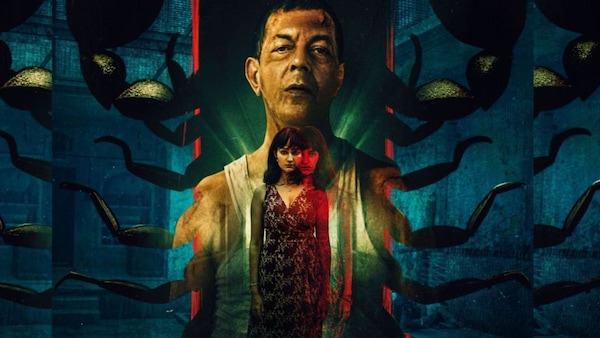
Promo poster for Khauf.
Last Updated: 11.57 AM, Apr 21, 2025
IN DELHI, an all-girls hostel is haunted. Strange noises are heard, and stranger things happen. Those living on the third floor, the focal point of the terror, are unable to step out. All except the one girl who has just arrived from Gwalior. Carrying pockets of horror in her body from the past, she seems immune to further dread. But stepping out in the urban jungle causes abrasion and flares up her past wounds. No one, it appears, is safe. But then, who is in Delhi?
In the last couple of years, the amorality of the city has been a fertile ground for shows in India. If Delhi Crime explored the social depravity of the space, then Made in Heaven looked at its failed moral compass; Paatal Lok probed into the foiled morality of the land and Trial by Fire inspected its scarring soul. The perversion of the city is so deep that the prospect of a lingering ghost at a ladies' hostel is not just reassuring but also promises to be cathartic. After all, when the presence of men on the street is deathly unsafe, then an otherworldly spirit can only offer protection.
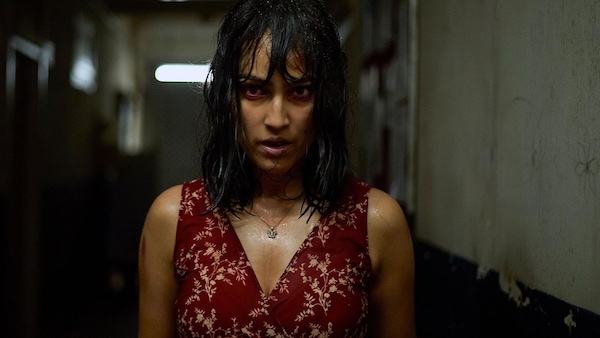
This is an urgent but familiar premise. More recently, Amar Kaushik’s Stree (2018), whose success spawned several similar horror comedies, centred on a lighter version of this; Khauf, created and written by Smita Singh, not just defies but subverts the setting, proving in essence that, in the case of women, even sustaining hope for belated justice is deceptive. The eight-episode series deep-dives into the precarity of female existence and conveys the omnipresence of patriarchy through horror as an embellishment and upshot. The result is a strikingly uncompromising work that uses the format of long-form storytelling not as an excuse to reiterate tropes but to tell a specific story with universal resonance.
Madhuri (a pitch-perfect Monika Panwar) has newly relocated to Delhi. The move was fuelled by professional aspiration but also personal grieving. Something terrible had happened to her at Gwalior. Delhi, she hopes, will provide some respite. The presence of her partner, the soft-spoken Arun (the assured Abhishek Chauhan), offers comfort. A common friend’s boyfriend, Nakul (Gagan Arora), helps her out with accommodation at a remotely situated hostel, but instead of easing her worries, things get exacerbated. The previous tenant in the room died six months back, and the women on that floor, four of them, are convinced the room is haunted. Try as they might, they cannot seem to step out.
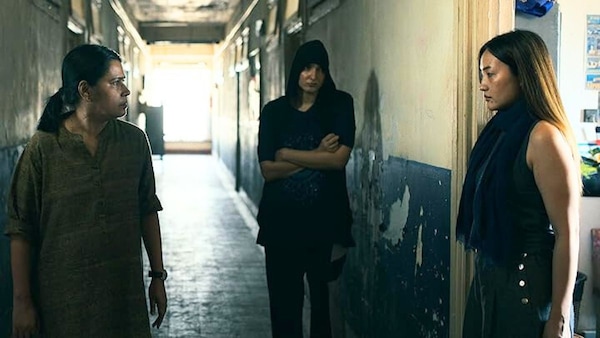
But even for Madhuri, who can step out, there is no respite. On buses, men press themselves against her, and she has a sinking feeling that the perpetrator of the abuse she had faced in Gwalior lives in the city itself. The scarring incident has also had a lasting impact on her relationship. With Arun being present when she was dragged away by three masked men, he continues feeling guilty, and Madhuri struggles to move on.
Directed by Surya Balakrishnan and Pankaj Kumar (the acclaimed cinematographer of films like Haider, Tumbbad), Khauf is one of those rare shows on horror that remains attuned to the vicious forms of it in the corporeal world before the supernatural elements make an appearance. In effect, the ghost does not disrupt but amplifies the dread that already exists for women.
And there are many women. There is Madhuri, a woman dealing with past trauma, at the centre. There are her hostel mates: Svetlana (Chum Darang), a girl from Nagaland who nurses a well-earned apathy towards the city; Nikki (Rashmi Zurail Mann), an affluent girl who found a community at the hostel after being a misfit elsewhere because of her stuttering; Rima (Priyanka Setia), a pregnant woman who resists staying with her husband in fear of forced adoption in case she births a daughter, again; Komal (Riya Shukla) who lived a private life, unknown to all; Anu (Asheema Vardaan) the girl who hoped to build a life before she passed. Looking after them is Gracie Dungdung (a fantastic Shalini Vatsa), the warden, and there is her friend, Illu Mishra (a terrific Geetanjali Kulkarni), a police constable who left her abusive alcoholic husband only to forge a difficult relationship with her son (a scene-stealing Satyam Sharma) who has been missing for months.
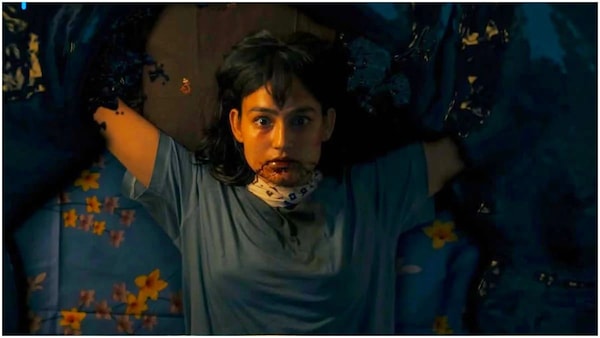
For them, Delhi is this beastly entity that has lent them shelter but has taken away a lot. They all either left their homes and caught in transit, or built one and bartered everything in the process. In the makers’ hands (Kumar is also the cinematographer), the urban landscape is depicted with a fevered aesthetic reminiscent of how Kolkata was shown in Prosit Roy’s supernatural horror film, Pari (2018). The moral squalor is hardly offset by visuals of heritage sites. Instead, the frame feels perpetually soaked with the dampness of the hostel walls and the mugginess in the weather. Khauf remains in the chaotically lit lanes and the cold spaces of offices in Delhi; unfolding mostly at the hostel, it uses the claustrophobia of the building as an analogy of the unlivable yet enticing trait of the city that is capable of kinship but incapable of sustaining it.
If the hostel builds up to be the microcosm of the capital, then it makes sense that the metropolis is haunted as well. Singh’s writing does not challenge but uses it to arrive at a recognisable conclusion. In her imagining of Delhi, a city well-defined by class, all stratifications collapse in its dispensable treatment of women. A man living in an upscale neighbourhood feels no different about them than an old hakim (Rajat Kapoor) in Old Delhi, who retains potency by killing young girls. Both treat women with redundancy (in the show, only two characters—the widowed Dr Sohini, essayed by Shilpa Shukla, and Gracie—are afforded peace who live without men). Seen in such a light, the ghost becomes as much a literalisation of the fright as an entry point to the series’ investigation into the feasibility of female existence in another sphere. It is a fascinating idea that uses horror with functional pointedness to make commentary, but also, mostly, to lay bare the many faces it wears.
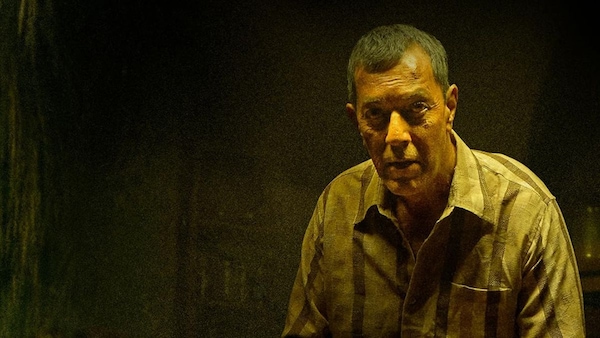
If it becomes easy to invest in the heightened horror of Khauf, it is because the performances are linearly spectacular. All of them, down to those who feature only in a handful of scenes, are compelling in their turns. The series culminates as a distinctive cumulative effort where each actor operates in a similar tonality and their performances meld to craft one of the finest Hindi shows in recent times that blurs the line between natural and supernatural, only to reiterate that this is no country for women.
Khauf is currently streaming on Prime Video.
